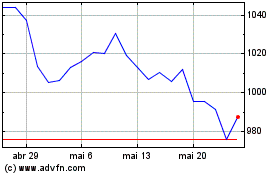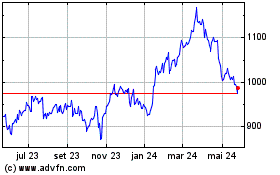When Tom Bentley tried to pull his money from a mutual fund
troubled by its large stake in Valeant Pharmaceuticals
International Inc., he instead received shares in a Springfield,
Mo. auto-parts retailer.
Sequoia Fund Inc. sent the retired computer hardware engineer
about 5% of his money in cash and the rest was stock in one
company–O'Reilly Automotive Inc. Mr. Bentley said he sold the
shares as soon as they appeared in his account on April 7, but they
had already dropped in value.
"It has been pretty horrendous," Mr. Bentley said.
Typically, mutual fund investors expect cash instead of stock
when they ask for their money back. But investors seeking to pull
large sums from Sequoia are getting a combination, according to
people familiar with the matter.
The $5.5 billion fund is wrestling with heavy withdrawals as
clients asked to pull more than $500 million in the first quarter,
according to Morningstar Inc.
Sequoia has been hit hard by its big stake in Valeant. The drug
company's shares are down roughly 65% this year amid questions
about its business and accounting practices, though they rallied
earlier this week.
Sequoia's repayment approach, called a "redemption in kind," is
part of a longstanding fund policy that allows it to give
shareholders mostly stock if they are pulling out $250,000 or more.
A person close to the firm said it has done thousands of in-kind
transactions over many years and that the majority are done for
redemptions in excess of $1 million.
"It's a perfectly legitimate strategy," said Jeffrey Sion, a
partner at Dechert LLP, who specializes in investment funds and
tax.
But the move has come as a surprise to some investors and their
advisers. While it is common for mutual funds to reserve the right
to hand out a basket of securities to large, sophisticated
institutional investors, it is rare for managers to use them to
redeem individual investors, lawyers and analysts say.
It is also less common for managers of stock funds to redeem
in-kind because equities, which trade on exchanges, are more easily
bought and sold than less liquid fixed-income assets.
"If you're a retail investor, who wants to get stocks? If you're
getting out of fund, presumably you're selling because you want
cash," said Michael Rosella, a partner at Paul Hastings LLP, who
specializes in investment management. "Most funds have the right to
do it, but you're not going to do it if you don't have to," he
said.
Sequoia's large stake in Valeant, which at one point last year
accounted for more than 30% of its portfolio as the drug company's
share price rose, has since hurt Sequoia's performance following a
sharp decline in the stock. The fact that the long-venerated mutual
fund let the position get so large has also hurt its credibility
with investors, the fund has acknowledged.
In addition to the withdrawals, the woes led to the resignation
last month of lead Sequoia manager Robert Goldfarb, the departure
last year of two independent directors concerned about the size of
the position, and shareholder litigation. The fund was down 11%
year to date through Thursday, while the broader market is about
flat.
"In-kind" redemptions have benefits for funds such as Sequoia
that are experiencing redemptions. Unlike with sales for cash, the
fund doesn't have to recognize a capital gain on such transactions.
As a result, remaining investors don't bear the tax implications of
sales associated with exiting shareholders, according to fund and
tax lawyers.
Meeting redemptions with shares also keeps managers from having
to sell stock to raise cash, which fund analysts say can weigh on
performance.
Sequoia's policy tells shareholders it is "highly likely" that
they will receive all or part of their withdrawal in securities if
they are pulling more than $250,000 from the fund, regardless of
whether they have a bank or brokerage account to which stocks can
be delivered.
The fund has seven days to meet redemption requests and
determines which stocks investors will receive. The firm typically
pays out in stocks with high unrealized capital gains that trade
often, and it advises redeeming shareholders to sell the securities
they receive at market close on the day they exit the fund, said a
person close to the firm.
But such redemptions often shift risk and burdens from the fund
to its selling investors, especially if they hold the fund in a
taxable account. Those who receive all or most of their assets in
stock may not have enough cash to pay taxes due on the redemption
without selling the stock.
In addition, funds don't necessarily give investors a pro-rata
basket of stocks, which can expose the newly given holding to
market risk from lack of diversification.
The stock shares also may rise or fall in value after the
investor receives them, producing capital gains and losses. In this
case, the taxable gain or loss is measured from the value of the
stock on the day of the redemption, according to Robert Willens, an
independent tax expert based in New York.
Selling those shares will also incur transaction costs that can
be steeper for individual investors than large investors that
benefit from longstanding relationships with banks and brokers and
economies of scale.
Write to Laura Saunders at laura.saunders@wsj.com and Sarah
Krouse at sarah.krouse@wsj.com
(END) Dow Jones Newswires
April 08, 2016 12:25 ET (16:25 GMT)
Copyright (c) 2016 Dow Jones & Company, Inc.
O Reilly Automotive (NASDAQ:ORLY)
Gráfico Histórico do Ativo
De Jun 2024 até Jul 2024

O Reilly Automotive (NASDAQ:ORLY)
Gráfico Histórico do Ativo
De Jul 2023 até Jul 2024
